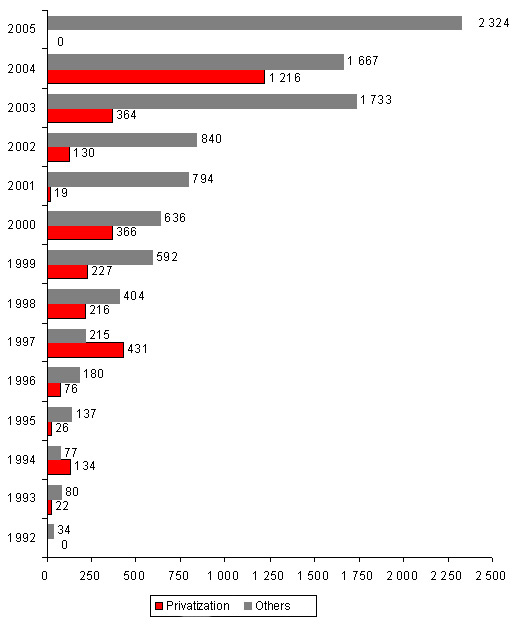Investments
 |
Because of low costs of labor force [the average monthly pay in the sector is 91 EURO] the branches characteristic of man-hour – e.g. needlework and the refining alteration [import of fabrics and their re-export after alteration]. It all makes it possible for the Bulgarian entrepreneurs to compete with other companies from Central and Eastern Europe and Turkey.
Food and food processing industries - – offer particularly interesting investment opportunities resulting from the national experience and the needs for modernization related to production development in the following branches: fruit and vegetable processing, wine production, animal breeding, meat processing and fodder production.
A large area of farming land [55% of total country area] and good climate favor investments in the food industry. About 50% of produced food is exported. The sales of juices and mineral water increase. For example, the consumption of beverages [mineral water and juices] increased by 15-20% yearly in 2002 – 2005. The producers of beer [e.g. Heineken, Interbrew, Carlsberg] and food processing companies [including Kraft Foods and Nestle] have invested in the Bulgarian food industry.
Financial services - – the development of the financial services market is similar to the development that took place in the transformation period in Poland. Bank services are now the dominating type of the financial services. With their [and the insurance services] fast development it is expected that with the growth of wealth a necessity of alternative financial services will appear, just as in Poland. Leasing, credit agencies and cash loans for those with low income belong to the group of the future financial services. The development of financial services will be mainly stimulated by foreign investors, which are already present in the bank branch. About 85% of the assets of the bank sector is controlled by foreign investors.
Power industry - – this sector is one of the key branches of the Bulgarian economy. The projects related to modernization of the urban waterworks, which are old and need repairs because they generate high transfer losses will become the potential area of interest.
Transport infrastructure - the development of transport infrastructure is one of the priorities of the transport policy. It results from the guarantee of the capacity of strategic transport routes. The modernization of roads for adjusting the Bulgarian roads to European standards [related to heavy loaded transportation] is one of the potential projects. It is estimated that about 1200 km of roads will have to be modernized. The value of the financial means for the road projects in 2006 – 2015 exceeds 1.8 billion EURO. They include the construction and modernization of highways.
The value of planned railway projects means in 2006 – 2015 exceeds 1.4 billion EURO. The modernization and electrification of 200 m of railway from Plovdiv to the Turkish borderline is one of the most important investment projects.
| VIEW MOVIE |
Retail trade – the retail trade is one of the fastest developing branches with great opportunities for entrepreneurs. Metro, Billa, and Praktiker are the largest investors in the area large-area stores and supermarkets.
Inflow of direct foreign investments to Bulgaria in 1992 – 2005 [millions/USD]

Source: The Bulgarian Investment Agency






